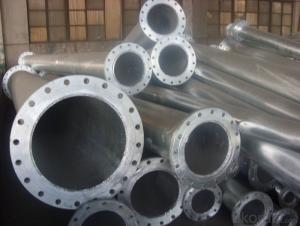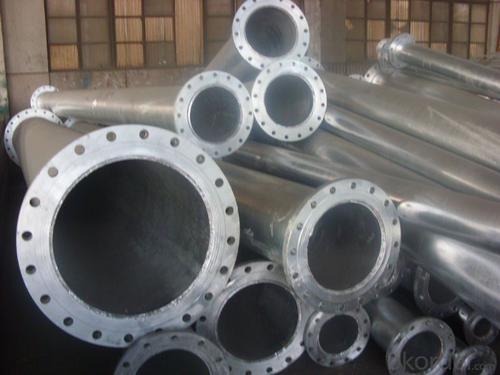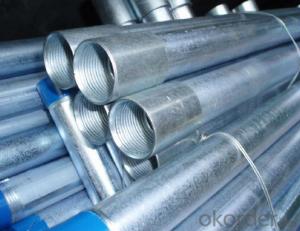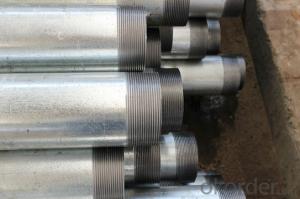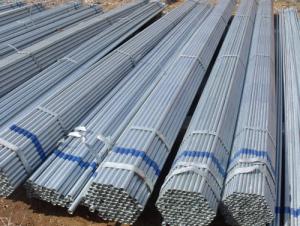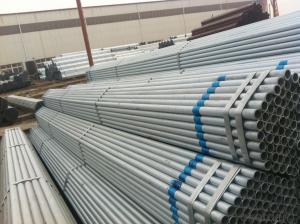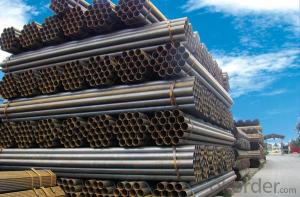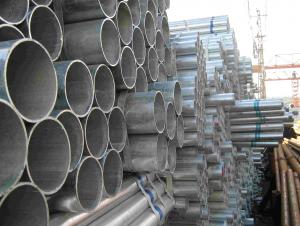hot dipped galvanized pipe with flanges
- Loading Port:
- China Main Port
- Payment Terms:
- TT OR LC
- Min Order Qty:
- -
- Supply Capability:
- -
OKorder Service Pledge
OKorder Financial Service
You Might Also Like
O.D | O.D tolerance | W.T | Thickness Tolerance |
1/2-12'' | ±0.3mm | 1.5-12 MM | ±8% |
Length | 3m,4m,5.8m,6m or according customers' requirements | ||
Certificate | ISO9001-2008,EN10210,API,Raw material cert,Mill cert,Reap on site inspection report,SGS,BV | ||
Standard | ASTM A53/ASTM A36 BS1387/BS1139/EN39/EN10219/EN10217/EN10297/EN10296/EN10025 etc | ||
Material | Q195/215/235/345, SS330/400/500, S235JR/S235JQ/S235J2, etc | ||
Inspection | With Hydraulic Testing, Eddy Current , Infrared Test, etc | ||
Technique: | Welded Hot rolled,heat extrusion | ||
Packing | in bundle or in bulk, PVC in blue or in strip | ||
Usage | For construction, Pluid and Greenhouse | ||
Main market: | Middle east,North and South America, East and West Europe, South and southeast Asia,Australia,Africa, | ||
Place of Origin | China | ||
HS code: | 73063090 | ||
Productivity | 2000Ton/Month | ||
Processing | galvanzied,inner and outer stab clean,bevelled oiled,painted black threading,with coupling and plastic caps protected packing in plastic cloths,3PE,FBE,corrosion resistant coating | ||
- Q: Can steel pipes be used for transporting liquids?
- Yes, steel pipes can be used for transporting liquids. Steel pipes offer excellent strength, durability, and resistance to corrosion, making them suitable for various applications, including the transportation of liquids such as water, oil, and gas.
- Q: What are the different methods of joining steel pipes?
- There are several methods of joining steel pipes, including welding, threading, flanging, grooving, and using mechanical couplings.
- Q: What are the advantages of using steel pipes in industrial plants?
- Using steel pipes in industrial plants offers numerous advantages. Firstly, their exceptional strength and durability make them ideal for transporting materials and fluids under high temperatures, pressures, and heavy loads. Secondly, steel pipes have excellent resistance to corrosion, which is crucial in industrial settings where they encounter corrosive substances or harsh environmental conditions. This resistance ensures their longevity, prevents leaks, and eliminates potential hazards. Additionally, steel pipes are highly versatile. They can be easily fabricated and customized to meet specific requirements, including different sizes and shapes. This flexibility simplifies installation and maintenance, reducing downtime and improving overall efficiency. Moreover, steel pipes have a smooth interior surface, allowing for efficient material flow with minimal resistance and pressure drop. Their smoothness also prevents the accumulation of deposits and contaminants, ensuring a clean and hygienic environment. Furthermore, steel pipes exhibit high resistance to fire, providing an added layer of safety in industrial plants where fires can have disastrous consequences. Lastly, while the initial installation cost of steel pipes may be higher compared to other materials like plastic or copper, their durability and low maintenance requirements result in significant long-term cost savings. With a long lifespan and resistance to corrosion and damage, the need for frequent replacements or repairs is minimized. In conclusion, the use of steel pipes in industrial plants offers various advantages, including strength, durability, corrosion resistance, versatility, efficient flow, fire resistance, and cost-effectiveness. These qualities make steel pipes a reliable and efficient choice for diverse applications within industrial facilities.
- Q: What are the different methods of measuring the thickness of steel pipes?
- There are several methods of measuring the thickness of steel pipes. One common method is using ultrasonic thickness gauges, which send high-frequency sound waves through the pipe and measure the time it takes for the waves to bounce back. Another method is through magnetic induction, which uses a magnetic field to determine the thickness based on the changes in the field caused by the pipe's thickness. Additionally, there are mechanical methods such as using calipers or micrometers to directly measure the thickness of the pipe.
- Q: How do steel pipes handle seismic expansion joints?
- Steel pipes handle seismic expansion joints by incorporating flexible components, such as bellows or expansion joints, which can absorb the movement caused by seismic activity. These flexible components allow the pipes to expand and contract without causing stress or damage to the system, ensuring the integrity and longevity of the pipeline during seismic events.
- Q: How are steel pipes protected against external damage?
- Steel pipes are protected against external damage through various methods such as coatings, wraps, and cathodic protection. These protective measures help prevent corrosion, abrasion, and other forms of external damage, ensuring the durability and longevity of the pipes.
- Q: What is the maximum allowable pressure for steel pipes?
- The maximum allowable pressure for steel pipes depends on various factors such as the type of steel used, the diameter and thickness of the pipe, and the specific application or industry requirements. The American Society of Mechanical Engineers (ASME) provides guidelines and standards for pressure vessel and piping design, including the determination of maximum allowable pressure. ASME B31.1 and B31.3 are widely used codes for power piping and process piping respectively. These codes specify the design criteria for various materials, including steel, and provide formulas and charts to calculate the maximum allowable pressure for different pipe sizes and wall thicknesses. The maximum allowable pressure is typically determined based on the pipe's ability to withstand internal pressure without causing any permanent deformation or failure. It is important to note that the maximum allowable pressure for steel pipes may also be influenced by other factors such as temperature, corrosion, and the presence of any external loads or stresses. Therefore, it is essential to consult the relevant codes, standards, and engineering calculations specific to the application to ensure the safe and reliable operation of steel pipes under the given conditions.
- Q: How do you protect steel pipes from external damage?
- To protect steel pipes from external damage, several measures can be taken. 1. Coating: Applying a protective coating on the surface of the steel pipes can help prevent external damage. Common coating options include epoxy, polyethylene, and fusion bonded epoxy (FBE) coatings. These coatings act as a barrier between the pipes and the surrounding environment, shielding them from corrosion, abrasion, and other external factors. 2. Cathodic Protection: This method involves using a sacrificial anode or impressed current to protect the steel pipes from corrosion. By connecting a less noble metal to the pipes, it attracts the corrosive elements, sacrificing itself instead of the pipes. This process helps extend the lifespan of the pipes and prevents external damage. 3. Wrapping and Taping: Wrapping the steel pipes with materials such as polyethylene or polypropylene tapes provides an extra layer of protection. These tapes act as a barrier against moisture, chemicals, and physical impact, safeguarding the pipes from external damage. Additionally, heat shrink sleeves can be used to provide insulation and protection against corrosion. 4. Underground Installation: Proper installation of steel pipes underground is crucial to protect them from external damage. This includes ensuring suitable trench depth, backfilling with appropriate materials, and avoiding excessive bending or stress on the pipes during installation. Proper bedding and padding techniques also contribute to the pipes' protection from external factors. 5. Regular Inspection and Maintenance: Periodic inspection and maintenance are essential to detect any signs of external damage early on. This can involve visual inspections, non-destructive testing, or even utilizing advanced technologies like pipeline integrity management systems. Timely repairs and maintenance can help prevent further damage and extend the lifespan of the steel pipes. Overall, protecting steel pipes from external damage requires a combination of preventative measures, proper installation techniques, and regular maintenance. By implementing these strategies, the pipes can be safeguarded against corrosion, abrasion, impact, and other factors that may compromise their integrity.
- Q: How can galvanized steel pipe be connected with stainless steel pipe?
- Welding methods are used to connect. Because galvanized pipe is in fact carbon steel pipe, so galvanized pipe and stainless steel pipe welding, in fact, carbon steel and stainless steel welding, welding of dissimilar materials.
- Q: How do steel pipes perform in marine environments?
- Steel pipes perform well in marine environments due to their high strength and corrosion resistance. The protective oxide layer formed on the surface of the steel helps prevent rust and deterioration caused by salty sea air and water. Additionally, steel pipes can withstand the high pressure and temperature fluctuations commonly found in marine applications, making them a reliable choice for transporting fluids and gases in offshore structures, ships, and other marine installations.
Send your message to us
hot dipped galvanized pipe with flanges
- Loading Port:
- China Main Port
- Payment Terms:
- TT OR LC
- Min Order Qty:
- -
- Supply Capability:
- -
OKorder Service Pledge
OKorder Financial Service
Similar products
Hot products
Hot Searches
Related keywords
